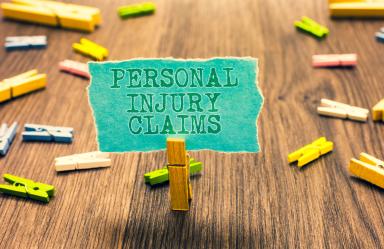Missouri Personal Injury Laws

One of the 10 largest medical malpractice cases in the U.S. in 2022 involved a Missouri woman whose baby suffered a brain injury due to medical negligence during labor.
The mother, Rachel Harris, received an overdose of a labor-inducing medication, which caused severe oxygen deprivation in her baby. The child now has cerebral palsy, requiring care 24 hours a day.
A Jackson County jury awarded Ms. Harris $25.4 million in damages. It found the attending physician negligent in her care of the patient and in her supervision of the resident doctor who administered the excessive medication.
Medical malpractice is one of the many types of personal injury claims in Missouri. Others include cases resulting from car crashes, slip-and-fall accidents, dog bites, and hazardous products.
If you have suffered injuries from any of these incidents or another type of mishap due to someone’s negligence, this article can guide you in your pursuit of justice. It outlines the actions you need to take, including meeting deadlines for filing claims, the damages you are entitled to under the law, and the evidence you need to successfully obtain compensation for your injuries.
Missouri Tort Laws
A victim of harm or injury in Missouri has the right to seek compensation from the person who caused it.
Although there are injuries that are permanent, the goal of compensation is to put the victims back in the same situation they were in before they incurred the injury.
In other words, compensation for personal injury follows the concept of restitution — making the victim whole again — rather than punishment.
If you have been injured by someone and wish to exercise your right to compensation, you can file a personal injury lawsuit according to the rules set in the Revised Statutes of Missouri.
Remember that personal injury lawsuits are not criminal but civil actions, also known as torts. Your case may fall into one of the following categories:
Intentional personal injury.
Negligent personal injury.
Strict liability injury.
Intentional Torts
Assault, battery, false imprisonment, and defamation are common examples of intentional torts. They involve actions that are deliberate or carried out on purpose.
In intentional torts, it is not necessary to prove that the tortfeasor — also called the defendant — meant to cause the injuries that resulted from their action. What is critical to establish is that they acted willfully.
Negligence Torts
Car accident cases and most medical malpractice claims belong in this category. It is where a victim’s injury is due to someone’s negligence or reckless conduct.
To have a successful claim, the plaintiff must prove that the defendant had a duty of care and that they violated that duty, leading to the injury.
Simply put, the evidence must demonstrate that had the tortfeasor fulfilled their duty of care, the harm would have been avoided.
Strict Liability
Most personal injury claims arising from dog bites and defective products in Missouri follow the doctrine of strict liability. This means that in a dog attack, the owner is automatically responsible for the injuries that their pet causes, regardless of whether they had prior knowledge of the animal’s vicious behavior.
In product liability cases, liability arises if someone suffers harm from using or consuming an "unreasonably dangerous" product. Missouri law deems a product unreasonably dangerous if it causes an injury even when used for the purpose for which it was manufactured. When strict liability is applied, the manufacturer is liable, whether they were negligent or not.
Liable Parties in Personal Injury Cases in Missouri
Drivers, businesses, and medical professionals are among the most common defendants in personal injury cases. The following sections discuss their liability in various injury-causing situations.
Reckless Drivers
Negligent drivers cause road accidents that result in injuries or deaths. Running a red light, speeding, and tailgating are just a few examples of negligent driving behavior. A driver’s inaction, such as not using turn signals or headlights when required, not yielding, and failing to stop at a crosswalk, also constitutes negligence.
In a Missouri car crash, the insurance company of the negligent or at-fault driver should pay for the victim’s medical expenses and other related damages. This is the reason Missouri requires auto policies to include liability coverage: whoever is at fault in a car accident is responsible for paying.
The minimum liability coverage in Missouri is $25,000/$50,000. This means each person injured in an accident is covered up to $25,000, but if there are multiple claimants, the total coverage is only up to $50,000. If the damages exceed the policy limits, the driver who is at fault may be personally responsible for the amount that the insurance will not cover.
Bars Serving Underage or Intoxicated Patrons
Under Missouri law, if a customer at an establishment serving liquor causes personal injury or wrongful death because of intoxication, the victim or their family may sue the business owner.
The evidence required for a successful claim is either of the following:
The customer was less than 21 years old, and the bar was aware of or should have been aware of this fact.
The bar served the customer intoxicating liquor even though they were visibly drunk.
In this case, the bar's liability is not to the intoxicated customers but to the people injured by such customers. In addition, if intoxicated patrons are themselves hurt in an accident, they cannot hold the bar that overserved them liable unless they are underage.
Negligent Property Owners
In dog bite cases, negligent pet owners may be held liable for the victims’ injuries. If the attack happened on their property, they can be sued per Missouri’s premises liability law.
Any injury or accident, such as a slip and fall, that occurs on a property in Missouri makes the owner or possessor liable if:
They knew that there were threats to safety on the premises (e.g., wet floors, faulty stairs, malfunctioning elevators).
They failed to correct the situation or properly warn the victim of the danger.
However, certain exceptions apply depending on whether the victim is an invitee, licensee, or trespasser.
An invitee is someone who is expected to be on the property, generally for business reasons. A licensee also has permission to be on the property, usually as a social guest. Meanwhile, a trespasser is uninvited or has no permission to be on the property.
Under Missouri law, property owners have a greater responsibility to invitees and licensees for keeping them safe while on the premises than to a trespasser. So, if a trespasser slips on a wet floor in someone’s home and gets injured, they are not entitled to compensation for damages related to the accident.
Federal, State, or Local Government
Slips and falls, as well as other accidents, can also happen on public property, such as government buildings, parks, playgrounds, and sidewalks. If someone is injured because of dangerous conditions at such locations, Missouri law allows the victim to file a claim against the state or the municipality responsible for maintaining the property.
The U.S. government may also be sued under the Federal Tort Claims Act if a Missouri resident is injured on federal property. A victim has 90 days from the date of the injury to bring a claim against the government. This time limitation makes it advisable to hire a personal injury attorney. Further, tort cases against the government are difficult to prove unless the accident was due to unreasonably dangerous conditions, which makes professional legal representation even more necessary.
Manufacturers and Distributors of Dangerous Products
In cases involving product liability, a person or business may be responsible for injuries brought on by a defective or dangerous product if:
The defendant is responsible for the product reaching the market. It may be the company involved in the design, manufacture, or distribution of the product.
The victim used the product in a way that other products of the same type or nature are expected to be used.
The product contained a defect that was unreasonably dangerous when the victim purchased it.
The manufacturer or distributor did not put any warning on the product packaging about the dangerous condition of the item.
According to the Consumer Product Safety Commission, 29 million people suffer injuries and 21,000 die each year because of hazardous products. Manufacturers and distributors of these items, most of which are large corporations, try to minimize their liability by asserting that the victim is partially responsible for their injuries. To counter this defense, it is recommended that plaintiffs consult an experienced product liability attorney.
Negligent Healthcare Providers
Injuries due to medical malpractice are attributed to healthcare providers who fail to adhere to the standard of care that is expected of them. These include medical professionals responsible for the treatment and care of patients, such as doctors, nurses, surgeons, anesthesiologists, and pharmacists.
Many medical malpractice cases in Missouri involve misdiagnoses, surgical or anesthesia errors, inadequate follow-up care, emergency room mistakes, and the lack of informed consent to a procedure.
Victims of medical malpractice must demonstrate that their healthcare provider deviated from the accepted standard of care among experts in the same field of practice. Thus, it is common to have a medical expert as a witness to establish the standard of care required in a specific case and how the violation that led to the injury occurred.
How Much Can One Sue for Personal Injury in Missouri?
Damages in personal injury cases include the following:
Medical expenses: Victims of personal injuries are eligible for compensation for all costs associated with their medical care. This includes operations, medications, physical therapy, and hospital stays. Plaintiffs can claim compensation not only for past but also future medical expenses.
Lost income: Injuries can force someone to miss work or quit their job. This leads to a loss of livelihood and entitles the victim to compensation for missed wages, both past and future.
Pain and suffering: The law gives injury victims the right to be compensated for the mental and emotional impact of their injuries. In the Harris v. Sadi case, the $25.4 million jury award included $5 million for the plaintiffs’ pain and suffering.
Medical expenses and lost income are also called economic damages, whereas pain and suffering are non-economic damages. Plaintiffs may also receive punitive damages if they can submit clear and convincing evidence that the defendant acted with malicious intent and without regard for the safety of others.
Missouri law sets limits on punitive damages in certain cases. The highest amount that a victim can receive in punitive damages is $500,000 or five times the compensatory damages awarded, whichever is less.
There is no limit on the economic and non-economic damages that personal injury victims in Missouri can recover unless the cause of action is medical negligence. According to Missouri Revised Statutes Section 538.210, non-economic damages for victims of medical malpractice cannot exceed $400,000 for personal injury. However, if the injury is deemed catastrophic or results in death, the limit is higher at $700,000.
In addition to statutory caps on damages, another factor that can reduce the amount of compensation personal injury plaintiffs can receive is their percentage of fault in the accident. Because Missouri follows the doctrine of pure comparative negligence, plaintiffs are still eligible for compensation even if they are found to be 99% to blame for their injuries. However, the amount they will get is only equivalent to the defendant’s share of the fault.
When to File a Personal Injury Claim in Missouri
If the injury or loss you sustained in an accident is only minor, you may choose to settle out of court. However, if the other party’s offer is unreasonable, going to trial is your other option to obtain compensation for your injuries.
Like other states, Missouri has deadlines for filing lawsuits. If you let the deadline, also known as the statute of limitations, pass without bringing a claim against the party that caused your injuries, you also lose your chance to recover your damages.
In Missouri, the standard time limit for initiating a personal injury claim is five years. The statute of limitations typically runs from the date of the incident that caused the injury, but Missouri law makes exceptions for the following:
In the case of delayed injuries, the discovery rule applies. This means the statute of limitations begins on the date the injury is discovered or should have been reasonably discovered. The deadline is typically only pushed back a few days or weeks, but it is still important to note.
If the injured person is less than 21 years old or is mentally incapacitated, the statute of limitations is paused until the victim turns 21 or is declared competent. However, a parent or legal guardian may file a lawsuit on the victim's behalf even prior to the removal of the legal disabilities.
If the person responsible for the injury is a Missouri resident and travels to another state after the accident, the statute of limitations is put on hold until they return.
There are also personal injury claims with shorter time limits for filing:
In instances of medical malpractice, the injured have two years to bring a case against the negligent healthcare provider.
If the defendant in a case is a government agency or employee, a claim must be filed with the Office of Administration’s Risk Management Division no later than 90 days after the injury’s discovery.
In cases of fatal accidents, the victim’s family has three years to start a wrongful death action against the at-fault party.
Legal Resources for Personal Injury Victims in Missouri
The Missouri Bar
The Missouri Bar Association gives back to the community through various legal resources available on its website. Missourians looking for attorneys to assist them with their legal concerns can use the Official Missouri Directory of Lawyers. This tool helps users find attorneys closest to their location. In addition, the site offers downloadable PDF files on a diverse range of legal topics, from the steps a person involved in a car accident must take to how Missourians injured in mass disasters can protect their rights.
Missouri Legal Services
Low-income and disadvantaged Missourians are the main clients of this free legal assistance group. It focuses on certain civil law matters, protecting the interests of individuals involved in cases that could threaten their health, jobs, and families. Four legal aid programs serve Missourians in the counties where they are located. These are Legal Aid of Western Missouri, Legal Services of Easter Missouri, Mid-Missouri Legal Services, and Legal Services of Southern Missouri. Residents who wish to apply for legal aid may do so by using the contact and location details available on the Missouri Legal Services website.
Missouri Revisor of Statutes
The Revised Statutes of Missouri are available online and updated when a new law is passed or an existing one is amended. Chapter 537 is all about torts and actions for damages. It discusses the rights of parties involved in situations where people or property are damaged or injured. There is also a provision in the Tort Victims’ Compensation Fund, which is supported by some of the money awarded as punitive damages in personal injury cases.
Expertise.com StaffAuthor
Step into the world of Expertise.com, your go-to hub for credible insights. We don't take accuracy lightly around here. Our squad of expert reviewers, each a maestro in their field, has given the green light to every single article you'll find. From rigorous fact-checking to meticulous evaluations of service providers, we've got it all covered. So feel free to dive in and explore. The information you'll uncover has been stamped with the seal of approval by our top-notch experts.




